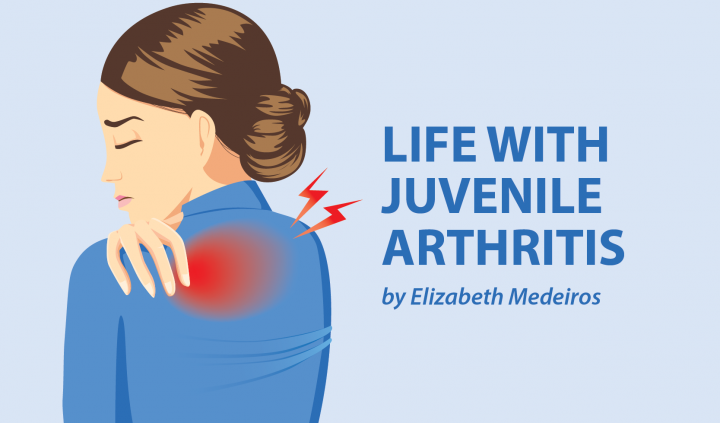While adolescence isn’t fun for anyone, I still remember it as one of the hardest times of my life. Eighth grade was one of my lowest points. In addition to the challenges of navigating puberty and pre-algebra, I dealt with the effects of treatments for juvenile arthritis. Not only were my cheeks pimply, but they were bloated. Between monthly doctor’s appointments and awful side effects, I missed a lot of class time. I didn’t have many friends anyway. I felt alone in the world, and I didn’t smile or laugh much that year.
It’s hard for anyone to deal with chronic pain, but it’s particularly rough on teenagers. While it’s common for teenagers to deal with depression and anxiety, teens with JA are more likely to deal with these issues. And it’s no wonder — they’re going through a lot.
Changing bodies
Most people don’t realize it, but JA and its treatments can have a huge impact on one’s body. Not only do the joints hurt, but they can swell, turn red, and in severe cases, deform. Teens with psoriatic arthritis may also deal with psoriasis on their skin and nails. Some medications, such as steroids, can cause unwanted weight gain, bloat, and acne.
It’s a lot to bear at a young age. So many teens feel uncomfortable during puberty, never mind dealing with additional body changes that their peers don’t undergo. It’s a time when your teen needs your support. You may not like that he insists on living in sweatpants and sweatshirts, but that may be the only way he feels comfortable. Likewise, she may insist on wearing a full face of makeup every day to cover her acne. It’s important to help find ways to help them feel confident in an age-appropriate and healthy way.
Finding friends
Teens never feel understood. But teenagers who are chronically ill can feel especially lonely. Worse, some teens may lose friends, especially during flares when it’s hard to hang out. It’s easy for teens to become isolated.
There are lots of opportunities for teens to find friends who “get it.” The Arthritis Foundation sponsors days out and summer camps for kids and teens with JA. Participating in the Walk for Arthritis or fundraising events for the National Psoriasis Foundation can also help teens feel empowered and make friends at the same time.
Counseling
Things didn’t start getting better for me until I started speaking with a counselor. Within a short time, things became brighter. My counselor helped me learn more positive ways to cope with my emotions, and we even found solutions for some issues. It was because of her that I pursued art, which I eventually turned into a career.
All kids with JA should have access to mental health care. Whether it’s a psychologist or a school guidance counselor, teens need someone to turn to. Therapy sessions can help encourage healthy coping mechanisms, and even help teens improve their communication skills. Even short-term counseling can have a big impact on one’s outlook.
Things get better
Once I hit high school, things became better. My body felt better once I started a new treatment, and I had newfound confidence after seeing a therapist a few times over the summer. But my mum still recalls the day I became Elizabeth again, the day a friend from JA camp came to visit. While we giggled in the living room, our mothers sat with tears of joy in their eyes. I remember my mum saying, “It’s been so long since I heard her laughter.”
Adolescence is a hard time for anyone. But teens with JA especially need all the support and love they can get. A good attitude can help patients achieve better health outcomes. Battling arthritis became much easier when I was able to think positively and felt supported.
***
Note: Juvenile Arthritis News is strictly a news and information website about the disease. It does not provide medical advice, diagnosis, or treatment. This content is not intended to be a substitute for professional medical advice, diagnosis, or treatment. Always seek the advice of your physician or other qualified health provider with any questions you may have regarding a medical condition. Never disregard professional medical advice or delay in seeking it because of something you have read on this website. The opinions expressed in this column are not those of Juvenile Arthritis News, or its parent company, BioNews Services, and are intended to spark discussion about issues pertaining to juvenile arthritis.


